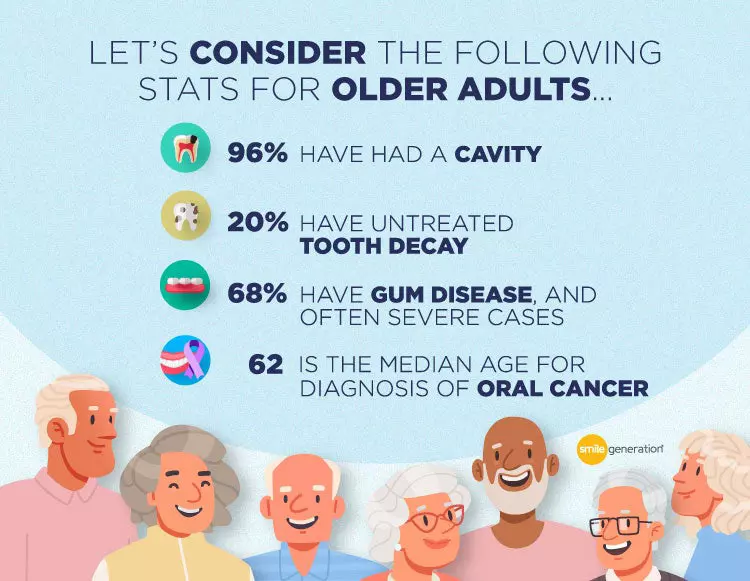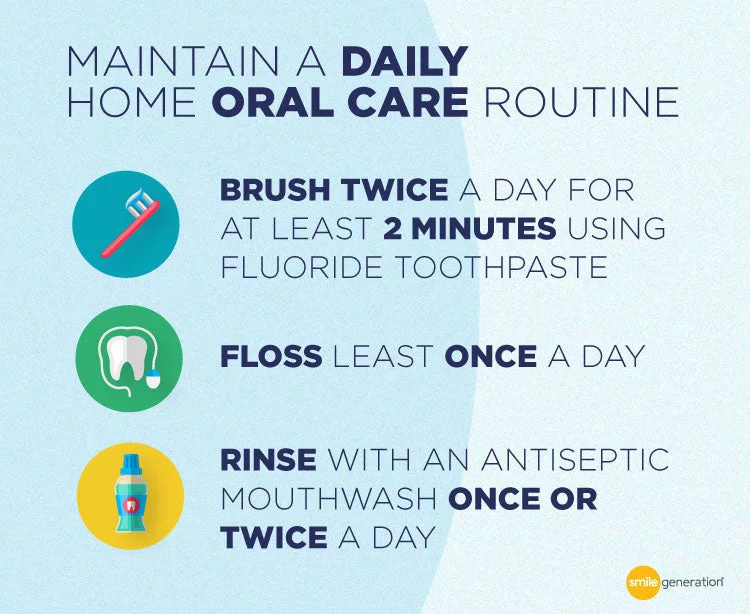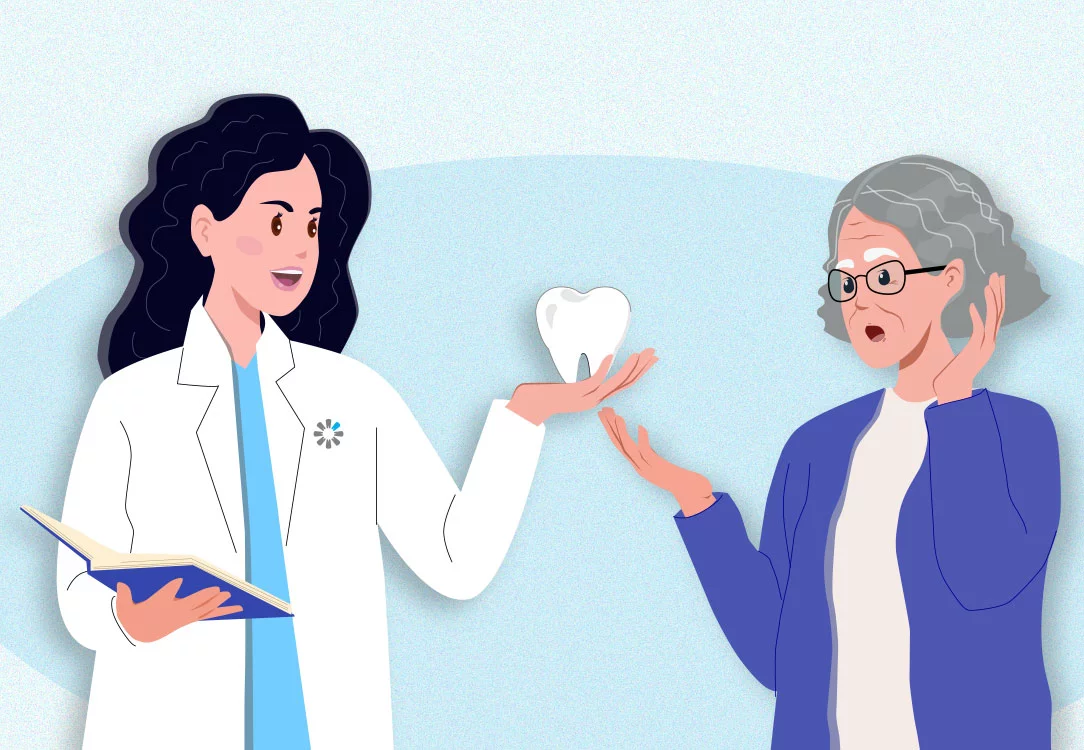
Does Oral Health Decline with Age?
- 96% of older adults have had a cavity
- 20% of older adults have untreated tooth decay [ii]
- 68% of older adults have gum disease [iii] and are often diagnosed with severe cases[iv]
- 62 is the median age for diagnosis of oral cancer [v]
What Contributes to the Decline in Oral Health?
Medications and Oral Health
Moreover, in addition to a prevalence of gum disease, older adults have high rates of candidiasis, or thrush, which is a fungal infection that causes a buildup of white patches in the oral cavity, redness and soreness, loss of taste and other symptoms in the mouth and throat. [xii]
Wear and Tear Over the Years
- Darkened or yellow-looking teeth from consuming foods and drinks that stain the dentin over the years, which becomes more noticeable as the enamel thins, allowing the staining to show through
- Shifting teeth next to missing teeth that they chose not to replace, which affects their bite and results in wear on the jaw bone and temporomandibular joint disorders (TMJ)
- Stomatitis, is a condition that inflames the oral tissues, from wearing a removable denture that doesn't fit right or that they don't clean enough
Loss of Oral Hygiene Habits
Other systemic illnesses and psychological changes in aging affect oral health, too. For example, some conditions might prevent them from taking care of themselves and their home care, which only exacerbates the problems with oral health.
Social Influences on Oral Health
Social influences are also at work here. Women are more likely than men to see a dentist and retain their natural dentition. The more educated patients have also influenced their probability of having better oral health than those without formal education. In addition, some older patients that lack a support system resulting from separation, divorce, or death of a spouse may become isolated and are more likely to have poor oral health than those who have people around. [xvii]

How to Improve Oral Health for Seniors
Without regular home care, plaque builds up on teeth and any exposed root surfaces, which leads to tooth decay and gum disease. Therefore, older patients (and patients of any age) should maintain a home care routine that includes:[xviii]
- Brushing at least twice daily for at least two minutes using fluoride toothpaste
- Flossing at least once a day
- Rinsing with an antiseptic mouthwash once or twice a day
In addition, senior patients should visit their dental team regularly. At the exam, the dental team can perform an oral exam and clean teeth. [xix] The ADA also recommends the regular topical application of fluoride at these visits to help protect against decay. [xx] For patients that have gum disease in its early or later stages can also begin treatment for those areas of inflammation, halting the progress of the disease and improving their oral health.
Treatment Options
In addition to treating gum disease, dental professionals can address other oral health issues older patients often face. For example, tooth loss is a common problem for this age group. However, some treatments can replace missing teeth to restore function and improve the patient's smile. Some treatments can even protect against bone loss.
Dental Implants
Dental implants are permanent replacement teeth affixed to a metal implant surgically placed in the jaw. This solution is the most like your natural teeth. [xxi] Plus, a dental implant feels like a natural tooth and doesn't require changing the surrounding teeth, as a dental bridge does. Plus, it protects against bone loss in the jaw. [xxii]
Dentures
Another option for replacing missing teeth is dentures. Dentures can be for part of your teeth or all of them, depending upon your needs. Dentures are removable appliances that look like your natural teeth and gums. However, they are not permanent; patients wear them all day and then take them out at night. [xxiii]
Paying for Treatment Without Dental Insurance
Many of our older patients no longer have dental insurance, and Medicare does not cover their dental care. However, there are options for our patients of any age that need help paying for dental treatment with no insurance. For example, our Smile Generation Dental Plan® is a dental savings plan with pre-negotiated discounts built into its membership. In other words, if you are a member, your treatment rates at a Smile Generation dental practice are lower than those for non-members.
- There is no waiting period, unlike many dental insurance policies
- Patients with pre-existing conditions cannot be denied coverage
- There are no annual maximums or deductibles
Still, have questions about seniors and dental care? Don't hesitate to contact us to find a Smile Generation dentist near you to schedule an appointment for yourself or someone you love. Not only can you get your questions answered about oral healthcare for older adults, but your Smile Generation team can recommend what they think will help provide the best possible outcome for their oral health treatment. Use our Find a Dentist tool to find a dentist near you.
Find your trusted, local dentist today!
Sources
[i] Explore Population Ages 65+ in the United States | 2022 Senior Report. America's Health Rankings. https://www.americashealthrankings.org/explore/senior/measure/pct_65plus/state/ALL. Published 2022. Accessed May 1, 2023.
[ii] Dye BA, Thornton-Evans G, Xianfen L, Iafolla TJ. Dental Caries and Tooth Loss in Adults in the United States, 2011-2012. NCHS Data Brief, no 197. Hyattsville, MD: National Center for Health Statistics; 2015.
[iii] Colby SL, Ortman JM. Projections of the size and composition of the US Population: 2014 to 2060. Current Population Reports, P25-1143. Washington DC: US Census Bureau; 2014.
[iv] Older Adult Oral Health. https://www.cdc.gov/oralhealth/basics/adult-oral-health/adult_older.htm. Published 2022. Accessed May 1, 2023
[v] Older Adult Oral Health. https://www.cdc.gov/oralhealth/basics/adult-oral-health/adult_older.htm. Published 2022. Accessed May 1, 2023.
[vi] Kramarow E. Dental Care Among Aged Adults 65 And Over, 2017.; 2022. https://www.cdc.gov/nchs/data/databriefs/db337-h.pdf. Accessed May 1, 2023.
[vii] Agd.org. https://www.agd.org/docs/default-source/policies-and-white-papers/impact-and-gd-articles/taking-care-how-dentists-should-prepare-for-aging-patients.pdf?sfvrsn=2. Published 2022. Accessed May 1, 2023.
[viii] Older Adult Oral Health. https://www.cdc.gov/oralhealth/basics/adult-oral-health/adult_older.htm. Published 2022. Accessed May 1, 2023.
[ix] Explore Population Ages 65+ in ALL. | 2022 Senior Report. America's Health Rankings. https://www.americashealthrankings.org/explore/senior/measure/pct_65plus/state/ALL. Published 2022. Accessed May 1, 2023.
[x] Aging and Dental Health (2023). Available at: https://www.ada.org/resources/research/science-and-research-institute/oral-health-topics/aging-and-dental-health (Accessed: May 1, 2023).
[xi] Aging and Dental Health (2023). Available at: https://www.ada.org/resources/research/science-and-research-institute/oral-health-topics/aging-and-dental-health (Accessed: May 1, 2023).
[xii] Agd.org. https://www.agd.org/docs/default-source/policies-and-white-papers/impact-and-gd-articles/taking-care-how-dentists-should-prepare-for-aging-patients.pdf?sfvrsn=2. Published 2022. Accessed May 1, 2023.
[xiii] Dental Care for Seniors. WebMD. https://www.webmd.com/oral-health/guide/dental-care-seniors. Published 2022. Accessed May 1, 2023.
[xiv] Aging and Dental Health (2023). Available at: https://www.ada.org/resources/research/science-and-research-institute/oral-health-topics/aging-and-dental-health (Accessed: May 1, 2023).
[xv] Dental Care for Seniors (2023). Available at: https://www.webmd.com/oral-health/guide/dental-care-seniors (Accessed: May 1, 2023).
[xvi] Daily care of teeth (2023). Available at: https://www.alzheimers.org.uk/get-support/daily-living/daily-care-teeth#:~:text=As%20dementia%20progresses%2C%20the%20person,in%20cleaning%20another%20person%27s%20teeth. (Accessed: May 5, 2023).
[xvii] Oralhealth.hsdm.harvard.edu. https://oralhealth.hsdm.harvard.edu/files/oralhealth/files/astateofdecay2018_oha.pdf?m=1528131549. Published 2022. Accessed May 1, 2023.
[xviii] Dental Care for Seniors (2023). Available at: https://www.webmd.com/oral-health/guide/dental-care-seniors (Accessed: May 1, 2023).
[xix] Dental Care for Seniors (2023). Available at: https://www.webmd.com/oral-health/guide/dental-care-seniors (Accessed: May 1, 2023).
[xx] Aging and Dental Health (2023). Available at: https://www.ada.org/resources/research/science-and-research-institute/oral-health-topics/aging-and-dental-health (Accessed: May 1, 2023).
[xxi] Higuera, V. What Can You Do for Missing Teeth? (2019). Available at: https://www.healthline.com/health/dental-and-oral-health/missing-teeth#implants (Accessed: May 3, 2023).
[xxii] About Dental Implants — AAID: American Academy of Implant Dentistry, Aaid.com. Available at: https://www.aaid.com/about/Press_Room/History_and_Background.html (Accessed: May 3, 2023).
[xxiii] Higuera, V. What Can You Do for Missing Teeth? (2019). Available at: https://www.healthline.com/health/dental-and-oral-health/missing-teeth#implants (Accessed: May 3, 2023).
Smile Generation blog articles are reviewed by a licensed dental professional before publishing. However, we present this information for educational purposes only with the intent to promote readers’ understanding of oral health and oral healthcare treatment options and technology. We do not intend for our blog content to substitute for professional dental care and clinical advice, diagnosis, or treatment planning provided by a licensed dental professional. Smile Generation always recommends seeking the advice of a dentist, physician, or other licensed healthcare professional for a dental or medical condition or treatment.








